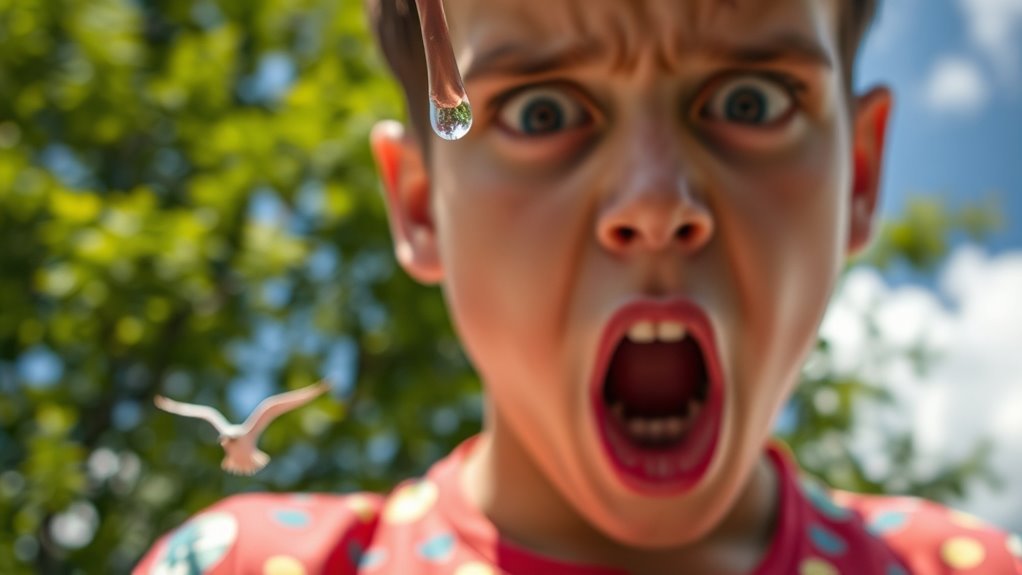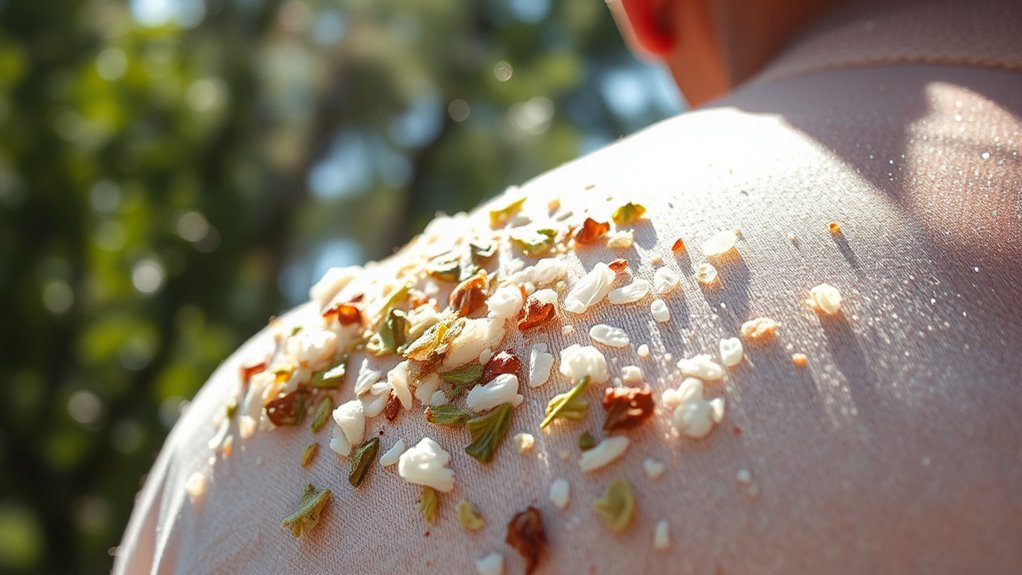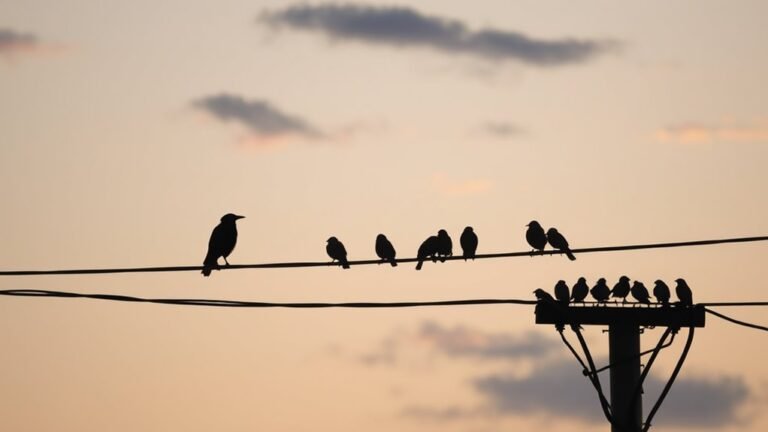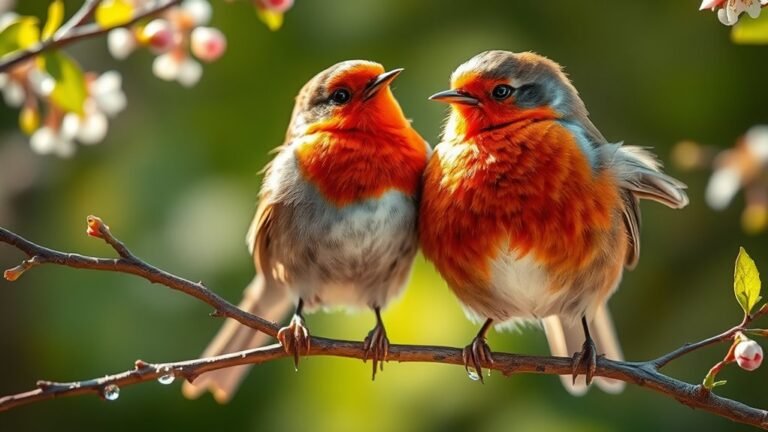What Does It Mean When a Bird Poops on You?
When a bird poops on you, it can mean different things depending on your culture. Some people see it as a sign of good luck or that you might gain money soon. Others think it is a bad sign. These beliefs show how our thoughts shape our experiences. There is also science that explains bird behavior, which can help us understand this phenomenon.
What do these different views mean for you? They can affect how you see events in your life. Whether you take it as a lucky sign or an unlucky one, your interpretation can influence your feelings and actions.
Key Takeaways
- Bird droppings can symbolize bad luck in some cultures, often causing concern or superstition.
- Conversely, many cultures, such as in Russia, see it as a sign of good luck and financial gain.
- Historically, bird droppings have been interpreted as messages from the divine, linking them to fortune and success.
- The unexpected nature of being pooped on can serve as a reminder to embrace surprises and foster personal growth.
- Bird droppings are rich in nutrients, playing a crucial role in ecosystem health, which underscores the importance of birds in nature.
The Common Belief: Good Luck or Bad Luck?

Many people think that when a bird poops on them, it brings bad luck. This belief is common and often seen as a sign of misfortune.
However, in some cultures, this event is actually seen as a sign of good luck. They believe it can attract wealth or positive change. You might feel unsure which belief to follow.
These ideas come from old superstitions that still exist today. Whether you see bird droppings as bad luck or good luck depends on your viewpoint and cultural background.
Exploring these different beliefs can help you relate to others who share similar views and experiences.
Cultural Interpretations Across the Globe
Bird droppings on a person can hold different meanings in various cultures. Many people view these occurrences as signs of luck or fortune.
In Russia, for example, bird poop is seen as a positive omen, suggesting that financial gain is on its way. In contrast, some cultures in Africa interpret bird droppings as bad luck, signaling potential misfortune.
These beliefs show how communities connect to nature and share views about luck and fate. They encourage discussions and strengthen cultural ties among people.
The Science Behind Bird Droppings

Bird droppings provide valuable information about birds and their environment. Birds digest food efficiently, leading to droppings that are high in nutrients. These droppings support the ecosystem in many ways.
The content of bird droppings often shows what birds eat, which helps track their health and diet differences among species. In cities, birds change their diets. This change can modify the nutrients in their droppings, showcasing how birds adapt to urban living.
Bird droppings also enrich soil, benefiting plant growth and nutrient cycling. Moreover, they help with seed dispersal, which supports local plants and biodiversity. Understanding these aspects helps us appreciate the vital role birds play in keeping ecosystems healthy.
Historical Context of Bird Poop Superstitions
Bird droppings have inspired both positive and negative beliefs throughout history.
Many cultures view bird poop as a symbol of good fortune, linking it to luck and prosperity.
Here are some key points to consider:
- Cultural Beliefs: Different cultures see bird poop as a sign of good luck.
- Wealth Attraction: People often believe that bird droppings can bring wealth and success.
- Historical Significance: Historical records show that people interpreted bird droppings as messages from the divine.
- Roots of Superstition: Today's interest in these beliefs draws from ancient traditions.
Understanding these points helps clarify the significance of bird poop in various cultures and traditions.
The Connection Between Birds and Spirituality

Birds hold significant spiritual meaning in many cultures. They often symbolize freedom, transcendence, and a link to the divine.
People believe that bird appearances can carry messages or omens. For instance, when a bird crosses your path, it may bring feelings of hope, guidance, or memories of loved ones who've passed away.
This connection to birds creates a sense of belonging and a deeper understanding of life. By observing their behavior and presence, you can gain insights that may aid your personal growth.
Embracing bird symbolism can enrich your spiritual journey and strengthen your connection to nature.
Birds as Symbols in Different Cultures
Many cultures see birds as powerful symbols that reflect their values and beliefs.
Bird symbolism connects to deeper cultural meanings and affects how people view nature. Here are four main interpretations of birds across cultures:
- Freedom: Birds symbolize liberation, representing the idea of breaking free from limits.
- Message: Many believe birds deliver messages from the spiritual realm, providing guidance for personal choices.
- Resilience: Birds show adaptability and survival, representing perseverance in tough times.
- Transformation: Certain birds signify change, promoting growth and renewal.
Personal Stories: When Nature Strikes
Birds often play a significant role in our lives, reminding us that nature can surprise us. Think about your own encounters with birds. Have you ever experienced a sudden drop from above or welcomed an unexpected feathered visitor?
Each of these moments can bring a sense of wonder or even laughter. These experiences connect us to nature and remind us that life can be unpredictable. You might find yourself smiling at these incidents, feeling a sense of connection with others who've faced similar surprises.
Such stories bond us, creating shared memories within our communities. They help us see these unexpected moments with nature as chances to connect rather than as misfortunes.
Bird Behavior: Why They Choose Their Targets
Birds don't choose where to poop randomly. Their target selection depends on several clear factors:
- Diet: Birds that eat fruits or seeds often have more bowel movements. This affects where they poop.
- Flight Patterns: Birds that fly low may poop near their frequent landing spots.
- Territory: Birds might poop on objects in their area to show dominance.
- Wind Dynamics: Wind can affect where their poop lands, guiding it to specific spots.
These behaviors highlight how birds interact with their surroundings and choose where to poop.
Understanding these patterns can deepen your appreciation for these creatures.
What to Do If a Bird Poops on You
Bird droppings can surprise you, but responding correctly is key. First, stay calm. It's just a minor hassle.
Next, check the affected area. Avoid rubbing the droppings into your clothes, as this can cause stains.
If you're outside, quickly wipe the area with a damp tissue or cloth. At home, treat any stains with warm water and mild detergent. Let the solution sit for a few minutes, then rinse it off.
Wash your clothing soon to prevent lasting damage. Try to laugh it off; this can help you move on from the situation more easily.
Lessons From Nature: Embracing the Unexpected
Embracing the unexpected can turn mishaps, like getting pooped on by a bird, into valuable lessons.
These moments remind us that surprises in life can teach us. Here's how to learn from these experiences:
- Acceptance: Recognize that things won't always go as planned.
- Perspective: Change your view; find humor or a lesson instead of feeling frustrated.
- Resilience: Use the experience to improve your ability to adapt.
- Mindfulness: Focus on the present; moments like these help you stay grounded.
Each of these steps can help you grow from unexpected situations and find meaning in them.
Frequently Asked Questions
Can Bird Poop Be Harmful to My Skin?
Bird poop can irritate your skin, especially if you don't clean it off quickly. The bacteria and organic materials in bird droppings can cause infections or allergic reactions. To reduce risks and help your skin heal, wash the area with soap and water as soon as possible.
How Do I Clean Bird Droppings off Clothes?
To clean bird droppings off clothes, act quickly. First, gently scrape away any excess droppings. Next, apply a fabric care solution directly to the stain. After treating the stain, wash the clothes as you normally would, making sure to focus on removing the stain. Always follow the care labels on your garments for the best results and to maintain fabric quality.
Are Certain Birds More Likely to Poop on People?
Certain birds, like pigeons and seagulls, often poop on people, particularly in cities where many birds gather. These species are common in urban areas, and their presence increases the chances of encounters with people.
Does Bird Poop Smell Bad?
Bird poop can smell bad depending on what it contains. It usually has uric acid, which can create a strong odor, especially if it dries. Cleaning bird droppings quickly can help keep any bad smells away.
What Animals Are Attracted to Bird Droppings?
Certain animals are attracted to bird droppings. Flies, ants, and raccoons often gather around these droppings. They find these nutrient-rich remains appealing. This behavior highlights their role as scavengers. These animals help recycle nutrients in their environment.

Hello, I’m Emily Price, the founder of Birds Affection. As a passionate bird enthusiast and spiritual seeker, I’ve always been fascinated by the symbolic meanings and mystical connections between birds and our lives. On this website, I share my knowledge and insights on the spiritual significance of various bird species, exploring their roles as messengers, guides, and teachers. Through my writing, I aim to inspire and educate others on the profound wisdom and beauty that birds bring to our world. Join me on this journey as we delve into the enchanting realm of bird symbolism and discover the hidden meanings behind these magnificent creatures.







